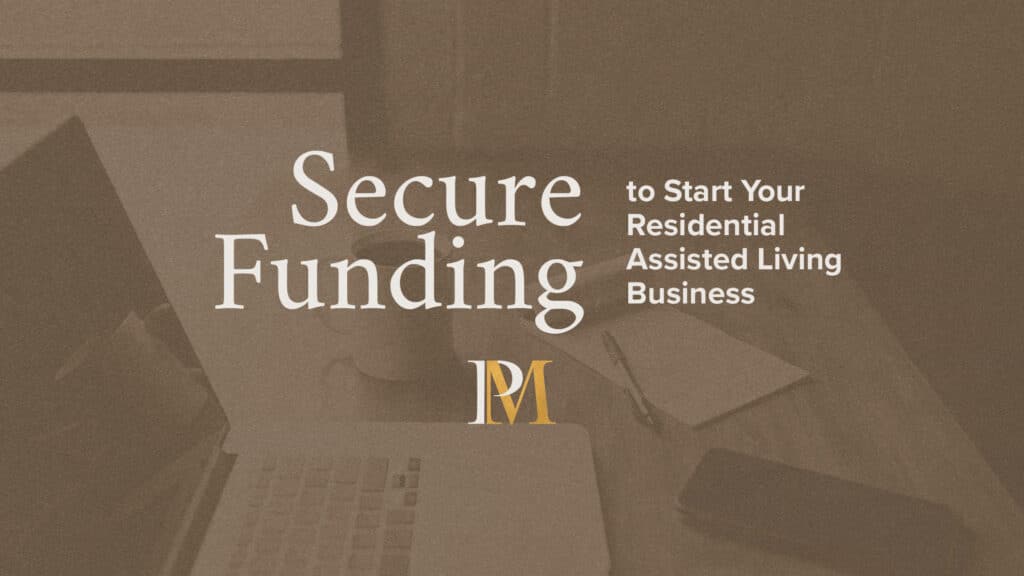As an entrepreneur, you know just how important real estate can be for your portfolio. But are you aware of one of the biggest investment opportunities in real estate and investing that has investors scrambling to get involved? Residential assisted living is the investment play that’s changing the game of cash flow.
Investors are pouring billions into this industry not only because of the income potential, but also due to the rapid growth that is expected in the coming years. The burgeoning senior population is driving the demand for senior living, which is projected to explode over the next two decades.
Starting a residential assisted living business can be a rewarding and profitable venture, but it also requires a significant amount of capital to acquire or renovate a property, hire staff, obtain licenses, and market your services.
There are numerous ways to finance a residential assisted living business, depending on your situation and goals. In this article, we will briefly explore some of the most common and effective funding options for aspiring residential assisted living business owners, as well as some tips on how to prepare for funding and pitch your business to potential investors.

Ways to Get Involved
If you are wondering how to make money in Residential Assisted Living, here are the best ways to get started today and earn income from this rapidly growing industry.
1 – Be the landlord. Rent the property to an operator and enjoy higher than market rent with long-term, low-impact tenants.
2 – Be the operator. Lease the real estate, and own and operate the business. Real estate provides good cash flow, but the business provides much more. The business is taking care of the residents and charging $4,000, $5,000, or $6,000 a month or more. The net profit before taxes from that is going to be about 30 percent. You’re going to pay rent to someone for the property. But the business itself can be very lucrative.
3 – Be both the landlord and the operator. This is what I do. I have one entity that owns the property and another entity that runs the business. The business entity pays rent to the property entity. You own and control both entities, so you get the best of both worlds. You own the property, get the tax benefits, depreciation, and appreciation. The business entity pays rent to the property entity. You have a long term tenant, and you get great financing options on the property.
4 – Be the lender or investor. Don’t want to get into the senior living business, but still want to make money off this incredibly lucrative market? As a lender or investor, you would be completely hands-off, you simply supply a portion of the funds to an operator and earn interest and dividends based on the success and increased equity of the business, based on the contract terms you agree upon.
Use Personal Savings to Fund Your Residential Assisted Living Business
One of the simplest and most straightforward ways to fund your residential assisted living business is to use your own personal savings. This option has several advantages, such as:
- You don’t have to pay interest or fees to a lender or share profits with an investor.
- You have full control over your business decisions and operations.
- You can start your business faster without waiting for approval from a third party.
It should be noted that using personal savings has inherent risks. You may deplete your emergency funds or retirement savings, which can put you at financial risk in case of unforeseen circumstances, or you may miss out on other investment opportunities or tax benefits that come with other funding methods.
Before you decide to use your personal savings to fund your residential assisted living business, you should carefully assess your financial situation and goals and weigh the pros and cons of each option.
Traditional Finance Options
Another common way to fund your residential assisted living business is to use traditional finance options, such as bank loans, SBA loans, mortgages, or lines of credit. These options can provide you with a large amount of capital at a relatively low interest rate, depending on your credit score and history. Some of the benefits of using traditional finance options are:
- You can leverage the value of your existing assets, such as your home or car, as collateral for a loan or mortgage.
- You can deduct the interest payments from your taxable income, which can lower your tax liability.
- You can build your credit history and score by making timely repayments, which can improve your chances of getting better terms for future loans or mortgages.
Using traditional finance options also presents some challenges. You will need to meet the eligibility criteria and requirements of the lender, which may include a minimum credit score, income level, down payment, or equity. You will be required to repay the loan or mortgage with interest over a fixed period of time, which can reduce your cash flow and profitability. And there is the potential that you may lose your collateral or face legal consequences if you default on your loan or mortgage payments. So before you apply for a loan or mortgage to fund your residential assisted living business, make sure your business plan is solid and that you can afford the repayments.
Investment Partners
Another option to fund your residential assisted living business is to partner with an investor who can provide you with capital in exchange for equity or profit-sharing in your business.
This option can be beneficial if you have a strong business plan and vision but lack the funds to execute it.
By leveraging your networks for potential investment partners, you may be able to access a large amount of capital with more favorable terms. It also provides the chance to benefit from the expertise, network, and guidance of the investor, who may have experience and extensive contacts in related fields. By finding the right investment partner, you share the risks of running the business with the investor, who may also help when you need to overcome challenges or solve problems.
Attracting the right investment partner usually requires a solid pitch. It is imperative that you do your due diligence by conducting a thorough analysis of the market, provide a detailed business plan, and establish effective systems by which you will operate your business.
Creative Financing Strategies
If none of the previously mentioned options work for you, or if you want to supplement them with additional sources of funding, you can also use some creative financing strategies to fund your residential assisted living business.
Grants are funds that are given to you by a government agency, a foundation, or a corporation for a specific purpose or project. You can apply for grants that are relevant to your residential assisted living business, such as those that support senior care, health care, or social services. You should be aware that grants are highly competitive and may have strict eligibility criteria and reporting requirements.
Another option is seller financing. This is where you negotiate with the seller of the property you want to buy or lease for your residential assisted living business and ask them to finance part or all of the purchase price. This can help you save on interest and fees and avoid the hassle of dealing with a lender. However, you should be careful that the seller is trustworthy and that the terms of the deal are favorable to you.
These creative financing strategies can help you fund your residential assisted living business in unconventional ways, but they also come with their own risks and challenges. It’s important to do your homework and consult with a professional when pursuing alternate strategies.
Preparing for Funding
Regardless of which funding option you choose for your residential assisted living business, you should always prepare yourself and your business for funding with a solid business plan. This means:
- Having a clear and realistic budget for your business, including the startup costs, operating expenses, and projected revenue.
- Having a detailed and compelling business plan that outlines your vision, mission, goals, market analysis, competitive advantage, marketing strategy, financial projections, and exit strategy.
- Having a professional and attractive presentation that showcases your business idea, team, value proposition, and funding needs.
- Having a strong and credible team that has the skills, experience, and passion to run the business successfully.
By preparing for funding, you can increase your chances of getting approved by lenders or investors and secure the capital you need to start your residential assisted living business. If you are looking for a more detailed resource to inform your business plan, check out Residential Assisted Living Business Plan.
Get A “Yes” For Your Residential Assisted Living Business

Once you have prepared for funding, the next step is to pitch your business to potential lenders or investors. To make a successful pitch, you should:
- Do your research on the lender or investor you are pitching to and tailor your pitch to their interests, goals, and expectations.
- Be confident and enthusiastic about your business idea but also honest and realistic about the challenges and risks.
- Be clear and concise about what your business does, how it makes money, how much money you need, how you will use it, and how you will repay it or generate returns.
- Be prepared to answer questions and objections from the lender or investor and address them with facts and evidence.
- Be respectful and professional throughout the pitch process, and follow up with the lender or investor after the pitch.
By following the steps outlined in this article, you can be well on your way to securing the funding you need to start your residential assisted living business, generating significant income, and making a positive impact on the lives of seniors in your community.
Whether you are new to residential assisted living or you have years of experience in the market, RAL Academy has the resources you need to be successful in this industry. If you want more information on how you can get involved or expand your current business, check out this exhaustive guide on How to Start a Residential Assisted Living Business.

